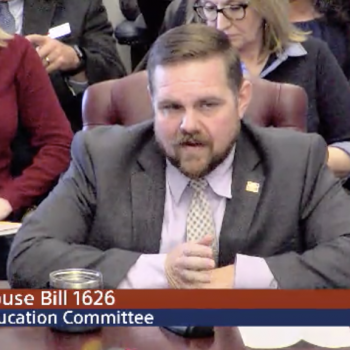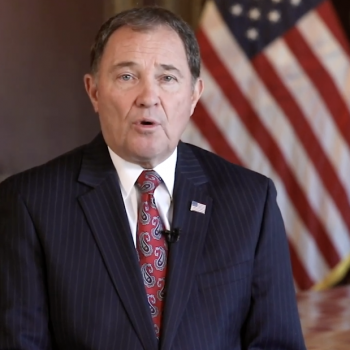This week, the Supreme Court delayed the scheduled execution of a Buddhist inmate from Texas after he was denied the presence of a spiritual adviser.

Setting aside death penalty criticisms for the sake of this post, it was the right move. Until the justices stepped in, Patrick Murphy (above) was going to be executed with a Christian chaplain at his side… even though he doesn’t share the faith. (His Buddhist clergyman was going to have to look through a window from the adjacent room.)
What made this story even more noteworthy was that the Supreme Court had a very different response to a very similar situation a month ago, when a Muslim inmate couldn’t get a like-minded chaplain at his execution. The justices allowed him to be put to death anyway.
Why the change of heart?
It’s irrelevant to this issue, but Murphy was sentenced to death for his role as part of the “Texas 7,” when he and six other inmates broke out of a maximum security prison.
While on the lam, the men robbed a sporting goods store on Christmas Eve. Responding police officer Aubrey Hawkins was shot and killed. Murphy, acting as a lookout in the getaway vehicle, was convicted of capital murder and sentenced to death.
He became a Buddhist on death row and requested a Buddhist priest at his execution because, his attorney said, “he needs to focus on the Buddha at the time of his death in order to be reborn in the Pure Land.”
Until the Supreme Court stepped in, that wasn’t going to happen. That’s why it’s strange to see them reverse court from February, when they denied a similar right to a Muslim inmate.
The execution was scheduled for Thursday evening. In a 7-2 vote, the Supreme Court blocked it while his claim before the court went forward. Texas may not execute Murphy, the court wrote in its unsigned order, “unless the State permits Murphy’s Buddhist spiritual advisor or another Buddhist reverend of the State’s choosing to accompany Murphy in the execution chamber during the execution.” Justices Clarence Thomas and Neil Gorsuch dissented, meaning they would have let the execution proceed.
“The relevant Texas policy allows a Christian or Muslim inmate to have a state-employed Christian or Muslim religious adviser present either in the execution room or in the concurring adjacent viewing room,” Kavanaugh wrote. Denying the same right to inmates of other religions constitutes “denominational discrimination,” he said.
Kavanaugh says that now, but he voted to let Domineque Hakim Marcelle Ray, the Muslim in Alabama, die without an imam present. In that case the court said the Alabama Department of Corrections didn’t allow non-employees in the room, and the state didn’t employ any imams.
It was also noted by Kavanaugh that Murphy made his request in time, unlike Ray, who asked for the imam with only two weeks to spare, but even that’s not his fault. He assumed they would accommodate his request.
Or maybe it was Justice Elena Kagan‘s blistering dissent from the Ray case that changed Kavanaugh’s mind.
Either way, the right decision was finally made. Religious freedom shouldn’t just apply to majority faiths. It’s unfortunate that Kavanaugh only seems to have figured that out within the past few weeks.




It’s Moving Day for the Friendly ..."
It’s Moving Day for the Friendly ..."
It’s Moving Day for the Friendly ..."
It’s Moving Day for the Friendly ..."